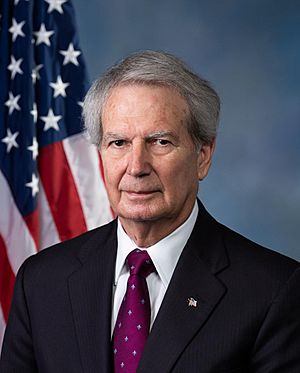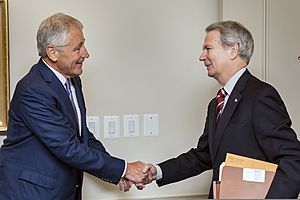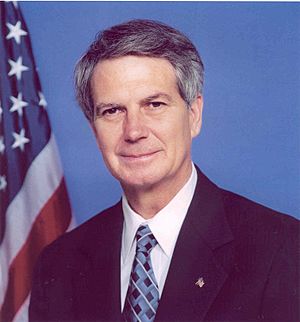Walter B. Jones Jr. facts for kids
Quick facts for kids
Walter Jones
|
|
|---|---|
 |
|
| Member of the U.S. House of Representatives from North Carolina's 3rd district |
|
| In office January 3, 1995 – February 10, 2019 |
|
| Preceded by | Martin Lancaster |
| Succeeded by | Greg Murphy |
| Member of the North Carolina House of Representatives from the 9th district |
|
| In office January 31, 1983 – January 1993 |
|
| Preceded by | Sam D. Bundy |
| Succeeded by | Charles McLawhorn |
| Personal details | |
| Born |
Walter Beaman Jones Jr.
February 10, 1943 Farmville, North Carolina, U.S. |
| Died | February 10, 2019 (aged 76) Greenville, North Carolina, U.S. |
| Political party | Republican (after 1994) |
| Other political affiliations |
Democratic (before 1994) |
| Spouse |
Joe Anne Whitehurst
(m. 1966) |
| Children | 1 |
| Relatives | Walter B. Jones Sr. (Father) |
| Education | Barton College (BA) |
| Military service | |
| Allegiance | |
| Branch/service | |
| Years of service | 1967–1971 |
| Unit | North Carolina National Guard |
Walter Beaman Jones Jr. (February 10, 1943 – February 10, 2019) was an American politician. He served in the United States House of Representatives for 12 terms. He was a member of the Republican Party from 1995 until his death in 2019. His district covered the coastal areas of North Carolina.
Before joining the U.S. House, he was a Democrat like his father, Walter B. Jones Sr.. His father was also a congressman. Walter Jones Jr. changed parties in 1994. Even as a Republican, he often disagreed with his party.
He first supported the Iraq War but later became a strong critic. He believed the Bush administration gave wrong information to Congress. He also disagreed with the Bush administration about firing federal lawyers. He supported raising the federal minimum wage.
During the Obama administration, he voted against his party's budget plan. This led to him losing important committee roles. During the Trump presidency, he often asked for closer looks at the Trump administration. He asked for Trump's tax returns to be released. He also wanted investigations into the 2016 election.
He believed in more freedom and less government control. He was part of a group called the Liberty Caucus.
Contents
Early Life and Education
Walter Jones Jr. was born on February 10, 1943. His parents were U.S. Representative Walter B. Jones Sr. and Doris (Long) Jones.
He grew up in Farmville, North Carolina. This is a small town near Greenville, North Carolina. He went to Hargrave Military Academy. In 1966, he earned a degree from Atlantic Christian College. This school is now called Barton College.
After college, he served four years in the North Carolina National Guard. This was from 1967 to 1971. He also worked for his family's business supply company.
North Carolina Legislature
Jones started his political career as a Democrat. He was first elected to the North Carolina House of Representatives in 1982. He served five terms until 1992. He represented Pitt County.
In the North Carolina House, he was known for wanting to change how political campaigns are funded. He also wanted to change how lobbyists work.
U.S. House of Representatives
Elections
- 1992 Election
In 1992, Jones ran for his father's seat in Congress. His father was retiring. Jones ran in the Democratic primary election. He got the most votes but not enough to win right away.
In a second election, he lost to Eva Clayton. She was supported by other candidates and the African American community.
- 1994 Election
In 1994, Jones changed his political party to Republican. He then ran in North Carolina's 3rd congressional district. This district included much of his father's old area. He ran against the Democrat, Martin Lancaster.
The race was close at first. Jones then shared a picture of Lancaster with President Bill Clinton. Many voters in the district did not like Clinton's social views. The 3rd district had many people with traditional values. Jones won the election 53% to 47%. He was the first Republican to represent this part of North Carolina since the Reconstruction.
- 1996–2004 Elections
From 1994 onwards, Jones won re-election easily. He always received at least 61% of the votes. His toughest election was in 2000. His opponent spent a lot of money trying to win.
Jones still won with 61% of the vote. This was helped by George W. Bush winning the district by a large amount.
- 2006 Election
He was re-elected for his seventh term in 2006. He received 69% of the votes. This was a strong win even though Republicans did not do well nationally that year.
- 2008 Election
Jones's change of mind about the Iraq War led to a challenge. He faced a primary opponent for the first time since his first run. He defeated Onslow County Commissioner Joe McLaughlin. Jones won 59% to 41%. In the main election, Jones won 66% to 34%.
- 2010 Election
In the general election, he defeated Johnny Rouse. Jones won with 73% of the vote.
- 2012 Election
He won the Republican primary against Frank Palombo. Palombo was a former police chief. Jones then won the general election against Erik Anderson.
- 2014 Election
He faced Taylor Griffin in the Republican primary. Griffin had worked for President George W. Bush. Jones won the primary election on May 6.
- 2016 Election
He defeated Democrat Ernest Reeves. Jones won with 67% of the votes.
- 2018 Election
Jones was re-elected for his final term in November 2018. He ran unopposed, meaning no one ran against him.
Time in Office

Walter Jones was known for being a conservative. However, his voting record became more moderate over time. He was often ranked as one of the most bipartisan members of Congress. This means he worked well with members from both parties.
Jones said his father could vote his conscience until he became a leader. Then, his father had to vote with his party. Jones said he would rather do what he thought was right. He did not want to "sell his political soul."
Jones was against unnecessary government spending. He also strongly supported banning online poker. In 2006, he helped create laws to stop online gambling.
He agreed with Democrats on some money issues, like raising the minimum wage. He loved animals and wanted a memorial for war dogs. In 2008, he supported Ron Paul for president. Congressional staff voted Jones as one of the kindest members of the House.
In 2007, Jones helped create a law with Heath Shuler. This law would require airlines to have sections where large movie screens were not visible. This was to protect children from seeing movies their parents might not like.
In 2008, Jones was one of only three Republicans to vote against some of President Bush's team. They refused to provide documents to Congress. In 2009, Jones was one of seven Republicans to vote against Joe Wilson. This was for Wilson's actions during President Obama's speech.
Jones gave out the Walter B. Jones Campus Defender of Freedom Award. In 2009, he gave it to B.J. Lawson. Jones said the Republican Party needed to connect with all people. He also supported more openness in institutions.
In 2010, congressional aides ranked Jones as the second nicest in the House. They also said he was the second least partisan member.
In 2011, Jones was one of four Republicans to vote against a budget plan. In 2012, he was removed from some committees. This was because he did not always follow party leaders. He kept his seat on the Armed Services Committee.
He wrote the Corolla Wild Horses Protection Act (H.R. 126;113th Congress). In 2017, Jones asked Congress to request President Donald Trump's tax returns. He wanted them reviewed in a private session.
In March 2017, Jones was the first Republican to ask Devin Nunes to step down from his committee role. He also called for an independent group to look into the 2016 election. He had concerns about a meeting Nunes had at the White House.
Foreign Wars

Jones first strongly supported the war in Iraq. But he later became one of the main Republicans against it. He was known for helping to rename "French fries" to "freedom fries" in the House cafeteria. This was a protest against France's opposition to the 2003 invasion of Iraq.
Later, Jones changed his mind about the fries. He said he wished it had never happened. He believed there was little reason for the war. He felt Congress was given wrong information. In July 2006, the names were quietly changed back.
Jones asked President George W. Bush to apologize for giving wrong information to Congress. He said, "If I had known then what I know today, I wouldn't have voted for that resolution." Jones felt the U.S. went to war "with no justification." He said the reasons for war, like weapons of mass destruction, were never true.
His change of mind came after attending a soldier's funeral. He heard the soldier's last letter being read. In 2005, he joined other members of Congress. They introduced a plan to start taking U.S. troops out of Iraq. Jones covered the hallway outside his office with photos of soldiers who died in Iraq.
In 2007, he and Rep. William Delahunt introduced a resolution. It aimed to stop the president from ordering military action without Congress's approval. This would only be allowed if the U.S. or its troops were attacked.
In 2007, he introduced a resolution about using military force against Iran. It said the President must talk to Congress and get approval first. This was unless there was an emergency attack from Iran.
In 2007, Jones was one of two Republicans to vote for a bill. This bill would have required President George W. Bush to bring troops home from Iraq by September 2008.
Jones's views on the Iraq War did not please President Bush. This kept him from getting a higher role on the Armed Forces Committee. Some Democrats asked him to leave the Republican party. Many Republicans in his district were also upset. His district had a large military presence.
In 2012, Jones proposed that waging wars without Congress's approval could be grounds for impeaching the President. In 2017, Jones criticized U.S. involvement in Saudi Arabian-led intervention in Yemen. He noted that Al-Qaeda in Yemen seemed to be an ally of the Saudi-led forces.
After the 2016 Orlando nightclub shooting, Jones called it "horrific and senseless." He expressed sadness for those who died. Jones also helped create the No More Presidential Wars Act in 2017.
Committee Assignments
In the 115th Congress, Jones served on these committees:
- Committee on Armed Services
- Subcommittee on Tactical Air and Land Forces
- Subcommittee on Military Personnel
Caucus Memberships
Jones was a member of the Liberty Caucus. This group included Republican representatives who believed in more freedom and less government. Other members included Ron Paul and Justin Amash.
He was also part of the Congressional NextGen 9-1-1 Caucus. He was a member of the Veterinary Medicine Caucus.
Political Views
Jones voted against the Tax Cuts and Jobs Act of 2017. He was worried it would add too much to the national debt. He said, "I'm all for tax reform, but it must grow the economy, not the debt." He also worried his constituents would pay more taxes. He agreed that the national debt was the biggest threat to national security.
Personal Life
Jones was raised a Southern Baptist. Later in life, he became a Roman Catholic. He married Joe Anne Whitehurst in 1966. They had one daughter named Ashley.
Illness and Death
In July 2018, Jones started missing votes because he was sick. In December, the House allowed him to be away for the rest of the session. He was sworn into the 116th Congress from his home.
In January 2019, he broke his hip. On January 26, 2019, his wife said he was in hospice care. This is care for people with serious illnesses.
Jones died on February 10, 2019, in Greenville, North Carolina. It was his 76th birthday. After his funeral, it was shared that he had amyotrophic lateral sclerosis. This is a serious illness. Members of Congress honored him in a special session in March 2019.
See also
 In Spanish: Walter B. Jones para niños
In Spanish: Walter B. Jones para niños
- List of United States Congress members who died in office
Images for kids



